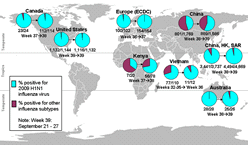2009 H1N1 Flu: International Situation Update
October 02, 2009, 11:00 AM ET
This report provides an update to the international situation as of October 2, 2009. As of September 20, 2009, the World Health Organization (WHO) regions have reported at least 318,925 laboratory-confirmed cases of 2009 H1N1 with more than 3,917 deaths, which is an increase of at least 22,454 cases and 431 deaths since September 13. The laboratory-confirmed cases represent a substantial underestimation of total cases in the world, as many countries focus surveillance and laboratory testing only on people with severe illness. The 2009 H1N1 influenza virus continues to be the dominant influenza virus in circulation in the world. From April 19 to September 12, 2009, 60.6% of influenza specimens reported to WHO were 2009 H1N1 viruses. In temperate regions of the Southern Hemisphere, disease due to 2009 H1N1 is declining or has returned to baseline. In tropical regions of the Americas and Asia, influenza activity due to 2009 H1N1 remains variable. In temperate regions of the Northern Hemisphere, there is increased influenza-like illness (ILI) activity due to 2009 H1N1 in many areas, including in most of the United States, parts of Mexico and Canada, and in some countries in Europe.
Selected Highlights
- The 2009 H1N1 influenza virus is the predominant influenza virus in circulation worldwide in most countries worldwide.
- The epidemiology of disease caused by 2009 H1N1 influenza in the Southern Hemisphere is very similar to that described in the United States in the spring of 2009.
- There have been no significant changes detected in the 2009 H1N1 influenza viruses isolated from persons in the Southern Hemisphere as compared to viruses isolated from persons in the Northern Hemisphere.
- As of September 25, 2009, WHO reported that more than 10,000 2009 H1N1 influenza isolates worldwide were tested and found to be sensitive to oseltamivir, an antiviral medicine used to treat influenza disease. Only 28 2009 H1N1 isolates tested have been found to be resistant to oseltamivir – 11 of these isolates were detected in the United States.
On September 18, 2009, the United States, together with Australia, Brazil, France, Italy, New Zealand, Norway, Switzerland and the United Kingdom, announced plans to donate 2009 H1N1 vaccine to the developing world.
International Resources for 2009 H1N1 Information
Health Organizations
- World Health Organization (WHO)
- ECDC (European Centre for Disease Prevention and Control)
- H2P (Humanitarian Pandemic Preparedness)
- Public Health Agency of Canada
World Health Organization (WHO) Regional Offices
- AFRO (WHO Regional Office for Africa)
- AMRO (WHO Regional Office for the Americas) / PAHO (Pan American Health Organization)
- EMRO (WHO Regional Office for the Eastern Mediterranean)
- EURO (WHO Regional Office for Europe)
- SEARO (WHO Regional Office for South-East Asia)
- WPRO (WHO Regional Office for the Western Pacific)
Travel and 2009 H1N1 Flu
Human cases of 2009 H1N1 flu virus infection have been identified in the United States and several countries around the world. For information on 2009 H1N1 flu and travel, see the CDC H1N1 Flu and Travel website.
Reports and Publications
- White House Report on 2009 H1N1 in the Southern Hemisphere
Issued August 2009 – This White House report was prepared by the Department of Health and Human Services (HHS) in coordination with the Office of the Director for National Intelligence (ODNI) and the Department of State (Dos) and describes the characteristics and impact of 2009 H1N1 influenza A virus in the Southern Hemisphere. - ECDC Interim Risk Assessment Influenza A (H1N1) 2009 Pandemic
Issued July 30, 2009 - This document provides an interim risk assessment of novel H1N1 flu in Europe prepared by ECDC. - World Health Organization Weekly Epidemiological record – Issued July 24, 2009
This document by WHO provides updates on the international novel H1N1 flu situation. - MMWR – Update: Novel Influenza A (H1N1) Virus Infection – Mexico, March-May, 2009 – Issued June 5, 2009 / Vol. 58 / No. 21.
This Morbidity and Mortality Weekly Report describes the novel influenza A (H1N1) outbreak in Mexico from March-May, 2009. - MMWR – Update: Novel Influenza A (H1N1) Virus Infections – Worldwide, May 6, 2009 – Issued May 8, 2009 / Vol. 58 / No. 17.
This Morbidity and Mortality Weekly Report describes worldwide novel influenza A (H1N1) infections as of May 6, 2009.
Get email updates
To receive weekly email updates about this site, enter your email address:
Contact Us:
- Centers for Disease Control and Prevention
1600 Clifton Rd
Atlanta, GA 30333 - 800-CDC-INFO
(800-232-4636)
TTY: (888) 232-6348 - Contact CDC-INFO
